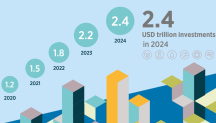

Renewables: The Best Value Energy Solution
Newsletter

By Adnan Z Amin, Director-General, International Renewable Energy Agency (IRENA)
As the urgency rises in our quest for answers to the climate change challenge, we can take heart from one remarkable piece of good news: renewables have become the best value energy for areas off the grid everywhere. In other words, technologies that were once considered "alternative" are proven to be viable and have become mainstream. Now, we need to take bold steps to increase the share of renewables in the energy mix.
Over the past five years, renewable energy has become cheap. The cost of solar panels has fallen by 75 per cent. Onshore wind has become the least-cost option for new grid supply in many countries worldwide – even in countries with cheap shale gas, such as the United States. The falling cost of renewable energy heralds a transformational turn of events, whose importance is still not fully realised. What it means is that we have a viable answer to rising greenhouse gas emissions, which not only allows us to meet our present and future energy needs, but does so potentially more cheaply than using fossil fuels.
How often do we face a serious crisis and then find that the solution makes us wealthier and healthier in the process? This is a genuine breakthrough, which presents us with a clear objective. Our job is to move renewable energy from the mainstream to the majority as soon as possible.
It is worth repeating some basic facts. By 2030, our planet will be home to 8 billion people. They will be richer and they will want to buy more things. Middle class spending is expected to soar, from US$21 trillion to $56 trillion annually. Under business-as-usual scenarios, the consequence of all this activity is clear. Energy demand and emissions will grow, and they will do so in a way that causes catastrophic climate change.
So how do we stop this? The answer seems clear. More than 80 per cent of human-caused emissions of carbon dioxide come from burning fossil fuels. We need to use energy more efficiently, and we need to replace fossil fuels with renewables. The good news is that this is entirely within our grasp.
CHEAPER TO ACT THAN TO DELAY
IRENA analysis shows that we already have the technology and the know-how to double the share of renewable energy by 2030, from 18 to 36 per cent. But in fact, since half of today's renewable energy still consists of traditional biomass uses, which is unsustainable and entails pollution and health risks, we need to quadruple the use of modern renewables, including sustainable biomass and biofuels. The even better news is that under the REmap 2030 initiative, IRENA has worked out that we can do this more cheaply than not doing so – when we take into account the cost of pollution, including ill health,environmental degradation and carbon emissions.
"How many crises do we face, where the solution makes us wealthier and healthier in the process?"
These developments have not gone unnoticed, and the process of transformation has already begun. Renewables last year accounted for more than half of new global power capacity, and investment in new renewable power capacity has outpaced investment in new fossil-based power generation for three years running.
Governments everywhere are beginning to act. China increased its installed photovoltaic (PV) capacity in 2013 to 13GW, about one-third of the world market. It now accounts for half of the global hydro and PV market, and hosts 90 per cent of world solar thermal and biogas capacity. And there are plans to accelerate this transition further.
Regulation in the US is acting as an effective brake on coal investments. Italy already produces 8 per cent of its electricity from solar PV. Germany has raised the share of renewables in power generation from 5 to 30 per cent. A growing number of island nations have completely converted to renewable power, or will do so in the coming five years.
The shift to renewable energy is effectively underway. And the more we invest, the cheaper it gets. This allows us to cut the Gordian knot of climate diplomacy, in terms of who pays and who benefits. With renewable energy, we all invest, and we all benefit. The stalemate between developed and developing countries disappears when the best route to reducing carbon dioxide emissions is also the best strategy for economic growth.
So why worry? If renewable energy is so obviously the solution, will markets not take care of the transition organically? The unfortunate answer is that, if business continues as usual, they will not.
THE REAL ENERGY PICTURE
Unless governments and policy-makers take urgent action, catastrophic climate change will be unavoidable. IRENA forecasts show that instead of doubling the share of renewables, we will reach only 21 per cent, an increase of just three percentage points and far from sufficient to mitigate the trend of global warming. There are three main reasons for this worrying scenario.
Firstly, there is not a level playing field. The world currently subsidises fossil fuels to the tune of more than US$500 billion a year, and that number is rising. This dwarfs support for renewable energy by a factor of five. At the same time, we do not adequately account for the cost of pollution on our balance sheets. By giving fossil fuels a free pass for the damage they cause to our health and the environment, we are effectively subsidising them even further: eighteen times more than we subsidise renewables, according to the International Monetary Fund (IMF).
The second reason is that too much attention is focused on power generation. Countless column inches are given to how we get our electricity. But more than three-quarters of the energy we use is in the form of heating and transport fuels. Much more attention needs to be focused on these areas: green buildings, electric cars, biofuels for industry and so forth.
Thirdly, a world living on renewables looks very different from the world market, including retailers, technology companies, community organisations and private individuals. This has caused incumbent utilities to increasingly worry about their future. Some are responding by trying to maintain the status quo; others are fighting to keep their subsidies. This puts a brake on the global energy transition.
URGENT STEPS TO PROSPERITY
The world has switched energy systems before, and in doing so has enjoyed great leaps in prosperity. The paradigm shift to modern renewable energy will happen, one way or another. But as of now, it won’t happen fast enough to avoid serious damage to our climate. We need to speed things up.
We are extremely fortunate, in that the falling cost of renewable energy has given us a choice. We can avert catastrophic climate change, and we can start by doubling the global share of renewable energy by 2030. In so doing, we will also create jobs, lower healthcare costs, and spread economic prosperity more widely. But to make that choice is not easy. It requires urgent, bold steps, from leaders willing to take the short-term hits from those who would rather carry on with business as usual. It will be a battle.
But it is a battle we simply cannot afford to lose.
Adnan Z Amin was elected as Director- General of the International Renewable Energy Agency (IRENA) in April 2011. A Kenyan national, he is a development economist specialising in sustainable development, with over 25 years of experience in the fields of international environment and sustainable development policy. He served as Head of the UN System Chief Executives Board for Coordination (CEB) Secretariat.
Mr Amin also served as the Executive Director of the Secretariat of the Secretary-General’s High Level Panel on UN System-wide Coherence. Previously, he had been Director of the New York Office of the United Nations Environment Programme (UNEP) and Special Representative of the UNEP Executive Director. He played the lead role in supporting the ministerial level intergovernmental process to review International Environmental Governance and UNEP’s participation in the World Summit on Sustainable Development. He has also served from 2000 until 2006 as a Trustee and member of the Board of Directors of the World Conservation Monitoring Centre, Cambridge, UK.
The International Renewable Energy Agency (IRENA) is an intergovernmental organisation that supports countries in their transition to a sustainable energy future and serves as the principal platform for international cooperation, a centre of excellence, and a repository of policy, technology, resource and financial knowledge on renewable energy.
IRENA promotes the widespread adoption and sustainable use of all forms of renewable energy, including bioenergy, geothermal, hydropower, ocean, solar and wind energy in the pursuit of sustainable development, energy access, energy security and low-carbon economic growth and prosperity. With over 130 states and the European Union as members, and active participation by many more signatories and applicants for membership around the world, IRENA helps countries achieve their clean energy potential and promotes renewable resources and technologies as the key to a sustainable future.
Original article appeared in UNEP Climate Action - Climate Leader Papers




